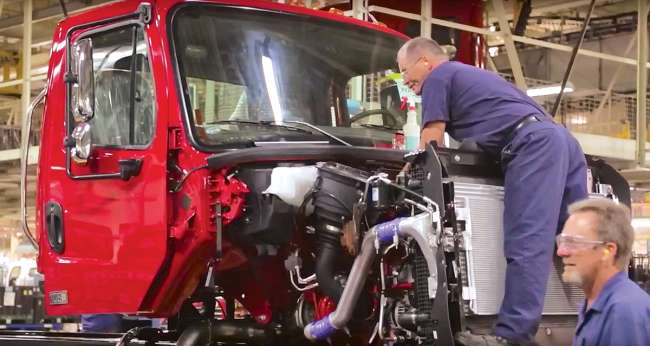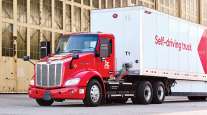Senior Reporter
Daimler Expects Supply Chain Constraints to Continue in 2019

Daimler Trucks is not optimistic that supply chain constraints will improve anytime soon to clear up ongoing shortages that have interrupted commercial vehicle production over the past 12 to 18 months amid record demand.
Daimler Trucks CEO Martin Daum called supply chain constraints “the biggest negative surprise for us last year.”
Daum said during a call Feb. 7 about its quarterly earnings that his primary concern remains whether U.S. and Mexican suppliers can find enough workers.
Daimler’s North American heavy-duty brands include Freightliner and Western Star. “So a lot of suppliers weren’t able to ramp up when it came to their labor workforce and that gave us, then, a shortage of parts. That means delays. That means express shipments. That means rework because we have to run our lines always at full speed. Then we have the trucks sitting off-line. And then we have to do the rework and then we have delayed deliveries even at year-end,” he said.
I will see the relief only if one or the other markets takes a break, which we don’t hope because that has other negative impacts.
Daimler Trucks CEO Martin Daum
Couple that with “very, very strong” demand for commercial vehicles globally and there are no easy solutions, he said.
“So, I will see the relief only if one or the other markets takes a break, which we don’t hope because that has other negative impacts. So we have to live for some time with that,” Daum said.
The company is the leader in U.S. retail sales of Class 8 trucks, according to WardsAuto.com.
Meanwhile, the U.S. supplier industry remembers what happened the last time the light-vehicle market was peaking in 2007, said Dan Griffin, Dana Inc.‘s senior director of global aftermarket.
“All these suppliers [ramped up] for great volumes,” he said.
Then the Great Recession broke and the shocks were felt throughout the auto industry. Suppliers and car makers “shuttered plants,” Griffin said.
“So I think there is a hesitancy on all sides to either ask supply chains to invest, or to outright invest in your own capacity, when you don’t know how sustainable these volume curves are,” he said.
In 2018, North American Class 8 orders reached a record 490,100 — smashing the previous high of 390,000 in 2004.
Last year, a total of about 422,000 trailer orders set an all-time annual record.
Issues affecting the supply chain are being felt in the aftermarket, too, Griffin said. Backorders for aftermarket parts are the highest in 10 years.
But Griffin expects to see supply chain improvements at the end of first quarter or early second quarter — and demand to “settle down in the 3Q, 4Q time frame.”
Some “critical bottleneck suppliers” are adding flex capacity, he said.
Trailer makers are experiencing the same shortages, though flooring and tires are the sole exceptions at keeping up in a supply chain that otherwise can’t, one trailer maker executive said.
“Every week we run into components not showing up that were committed and maybe ordered quite some time ago,” said David Giesen, vice president of sales for Stoughton Trailers. “It’s everything going right down our list.”
A weekly order for 30 items, is sometimes delivered with only 28, he said. That means completing a trailer only after the other components arrive — “a very inefficient process,” he added.
Another component supplier offered a mixed appraisal.
“We haven’t had any significant constraints for linehaul trucks,” said Brett Penzkofer, Meritor Inc.’s vice president of the North America aftermarket. “But for some of the specialty vehicles, that has been a longer lead and tougher.”
He said Meritor recorded additional business in 2018, and “some of those wins came because of what is going on out there and our ability [to supply], especially on the trailer side.”
Penzkofer added: “That hasn’t always been the story. It was hard for us. It was tough. But we weathered this very well.”





